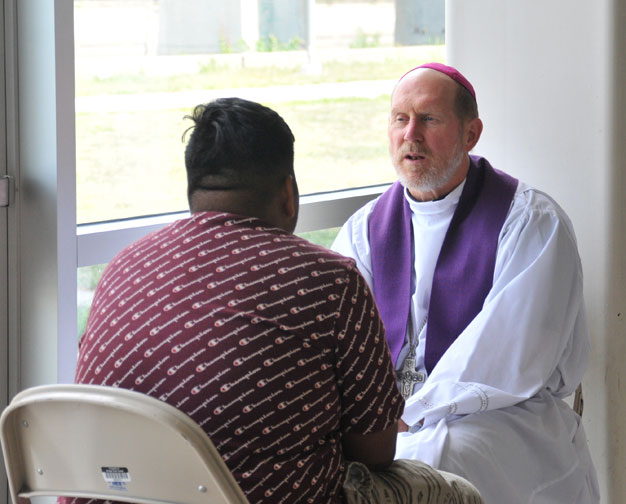
Bishop Thomas Zinkula hears a confession at the Diocese of Davenport’s Hispanic Theological Conference in Ottumwa last fall.
By Lindsay Steele
The Catholic Messenger
While hearing a confession, Father Corey Close experienced one of his most meaningful moments as a priest.
“There was a lamp in the room,” he recalled. After hearing the penitent’s confession and giving absolution, “I noticed the lamp was reflecting in (the penitent’s) eyes. I’d been looking at this person’s eyes for a while, and it caught me because the reflection wasn’t there before. I really believe the person was in a state of darkness, and the absolution brought that person into the light — it was amazing!”
The pastor of parishes in Brooklyn and Victor said this experience “highlights what the sacrament does. It clears us of our burden, takes us out of the darkness and takes the weight off our shoulders, as if we can breathe again. It’s beautiful.”
During Lent, the six-week period of prayer, fasting and almsgiving before Easter, Catholics are encouraged to make going to confession “a significant part of their spiritual lives,” according to the U.S. Conference of Catholic Bishops (USCCB). “Putting Christ back in the center of our lives, where he belongs, is one focus of Lent,” said Father David Brownfield, pastor of Church of All Saints Parish in Keokuk. He said the sacrament of penance is a “very good way” to do that.
What does it mean to sin?
The Catechism of the Catholic Church defines sin as “an offense against God” and a “failure in genuine love for God and neighbor.” It can take many forms, including idolatry, jealousy, anger, selfishness, evil thoughts, murder, adultery, fornication, theft and false witness.
Sins are evaluated by their gravity, the Catechism states. “Mortal sin destroys charity in the heart of man by a grave violation of God’s law; it turns man away from God, who is the ultimate end and his beatitude, by preferring the interior good to him. Venial sin allows charity to subsist, even though it offends and wounds it.”
Sin “not only hurts our relationship with God, it can isolate us and draw us apart from others,” said Father Troy Richmond, pastor of parishes in Muscatine and Columbus Junction.
Why confess to a priest? Can’t I just ask God for forgiveness myself?
The USCCB explains in its article, “Why Should I Confess My Sins to a Priest,” that although mortal sins must be confessed to a priest, “venial sin may, in fact, be forgiven in many ways.”
So why, then, did Jesus grant his apostles the power to forgive sins on his behalf, and why does the Catholic Church encourage its faithful to regularly offer confession to a priest?
“It is tempting to ignore our sins and think we have it all together,” Father Close said. “When we go to confession, we acknowledge that we are sinners in need of God’s mercy.”
Hearing the words “you are forgiven” from a priest is emotionally and spiritually powerful, Father Close added, noting that it is also important for priests to go to confession. “It is easier for someone who is outside of us to help us.”
Father Rich Adam, pastor of Sacred Heart Cathedral, believes that receiving forgiveness and reassurance of God’s love is like a “free and powerful” form of therapy.
The sacrament of reconciliation can bring great relief to people, especially when they have been avoiding confession for many years out of embarrassment for their sins, Father Brownfield said.
Father Richmond encourages Catholics to go to confession at least once a month. “That is how often I try to go to confession. By going once a month, I am more readily able to recall my sins. Also, by going more frequently, one benefits from the grace of the sacrament to fight against temptation and walk in virtue.”
Is confession just a “get out of jail free” card, or something more?
Father Brownfield said “good confessions” have three elements: contrition (sorrow for sin), confession (telling sins to a priest and penance (the desire or good intention to amend or change one’s life). “When we realize that we are sinners deserving damnation, God’s mercy can transform us into people of faith whose hope drives them to love others by living out the corporal and spiritual works of mystery.”
Father Close said that even with a perfect confession, “this doesn’t mean they (the penitent) won’t fall into sin again. For most people, sins are habitual.” They key factor is whether someone is truly sorry for what they have done. With that, there will be a desire to improve, even if progress is slow.
Joy in forgiveness
One of Father Richmond’s most powerful confession experiences happened in the early days of his priesthood. “I was invited to hear the confession of someone who had fallen away from the Catholic faith and was close to death. My willingness to come and hear the dying parishioner’s confession brought the fallen-away son back to the regular practice of his faith.”
“I love the sacrament, and I’ve seen it do powerful things,” Father Close said. “I wish I heard more confessions! God’s mercy is a profound thing.”
For more information about receiving the sacrament of confession, contact your parish.











